The Camp for Displaced Persons/Prisoners of War by the cricket pitch in Edwinstowe.1946 Edwinstowe Charity Cricket match on the cricket pitch. Frank Felstead is obviously enjoying the moment. The Camp was by the cricket pitch in Edwinstowe.
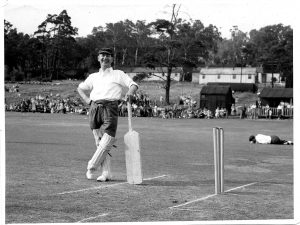
Have a closer look at his cricket bat!!
However, just look behind the pitch into the forest and you will see some huts. This is the same location as our pitch today. What were they?
View of the huts from the Cricket Pavilion into the forest. Are the trees by the pitch still here?
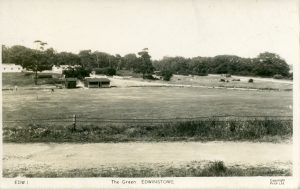
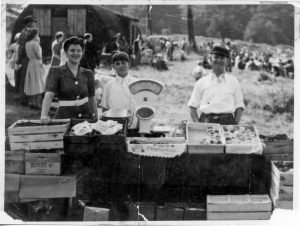
Frank Felstead raising money for charity. Notice the huts again where the POW/displaced people lived.
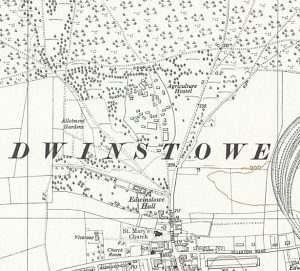
POW/Displaced Person’s Camp was called the Agricultural Hostel 1955
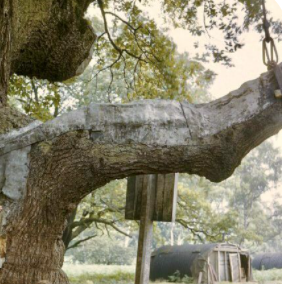
Ammunition Storage Huts by the Major Oak Post War
Read Vera’s story and all will be revealed.
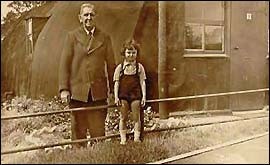
Vera Beljakov and her grandfather Alexander
It is often forgotten that there were prisoners of war held in this country. During the WW11, there was a POW camp at Edwinstowe.
Vera Beljakov lived there during the 1940s. She lived with her parents, Boris and Marianne and grandfather Alexander Beljakov, at the Edwinstowe POW camp for 2 years – 1948-49. Boris was the Camp translator and liaison person.
Vera, a former newspaper writer, remembers those childhood days.
It was 1948, I was 4 years old and I arrived at the Edwinstowe Camp. When my mother brought me and my paternal grandfather from war-ravaged Germany to join my father in Edwinstowe, it was more of an agriculture camp with military security.
The prisoners were East European soldiers as well as former Russian Tzarist officers. They had been sent to Edwinstowe to work in the fields. My father (Boris Beljakov) was employment at the camp as an interpreter/translator/liaison-man by the British camp authorities.
Most had no country to return to after WW11, since their homelands were now Soviet Union territories (Russia). Most were East Europeans and spoke a variety of languages from the Baltic North to Southern Ukraine. My father spoke most of these languages, including good English so he could talk to them in their own language.
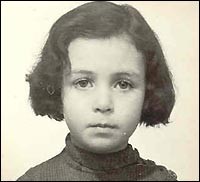 Passport Picture
Passport Picture
The spell of Sherwood
As I was a young child I did not understand what was happening but I fell under the spell of the forest, right on the doorstep of our prefabricated hut. These huts were by the cricket pitch where many of you play, walk and have fun today. For me this was paradise. I loved the major Oak and I visited it each day with my grandpa (Alexander Beljakov) He would walk and I would wildly run in and out of the bushes.
I did not have much to do with the ‘prisoners’, as my food was brought from the canteen to our hut or my mother cooked it because some of the communist POWs were nasty and unkind to us and it was unpleasant to be there. At night, the grown-ups played bridge, ‘skat’, chess, backgammon and other card games, while I was left alone in our hut, with strict instructions not to open the door to anyone, otherwise the ‘Big Bad Wolf of Sherwood Forest’ would carry me away to his den. I would crawl under the bed to sleep, so that the ‘Big Bad Wolf’ would not find me if he broke in. I soon realized this was not true.
Birthday delights
There were many happy times such as on my 5th birthday when I received a tricycle. This gave me a sense of freedom, racing around the camp, trying to copy the military policeman roaring around on their big black motorbikes.
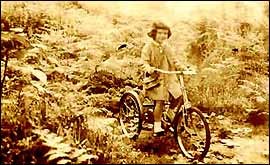
Life in camp
The Military Policeman spoilt me rotten with boiled sweets which I had never seen before in Germany, where we were all starving. I was adventurous and the Military Police were often called when I climbed trees and could not get down again. They were very kind and gave me chocolate. But when I was at home I would be smacked for my adventures and for causing so much trouble.
Education
Time came, when the Village Policeman arrived to inform my Mother that she was breaking the law by keeping me at home and away from Infant School. She offered to do ‘Home Teaching’ which did not go down too well, considering that she could not speak English in the first place (well…just a little to get by), but not enough to educate me into becoming a little ‘English Person’. Next day, reluctantly, my mum and I were marched by the Village Policeman to the Infant School (St. Mary’s School). My mother was crying but I was bouncing joyfully along, ready for the next adventure called “English School”, which would make a change from climbing trees and getting smacked for it. School was great. I wish I could remember my teacher’s name back in 1948, but on my first day at school she gave me a black crayon and asked me to colour in a cat’s outline. This was easy as I had spent a lot of time alone colouring. My drawings were displayed on the corridor walls. My speciality was Robin Hood, Maid Marion & the Big Bad Wolf.
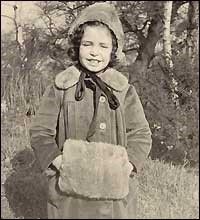
Although, I seemed to be the only child in the camp, there must have been one or two other camp boys. I remember being taught how to throw mud at wet sheets on washing lines. This made people cross as washing clothes took a long time. Hand washed in tubs of water. I only did it twice and then contact with the mischievous boys was banned.
There were many happy times such as weddings. As I look back, many things are the same as today with brides in white, men in suits and little girls in their best clothes.
A special time outside St Mary’s Church.
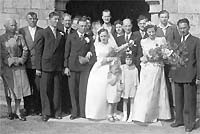
An Edwinstowe wedding in 1948. The bald-headed best-man is Vera’s father, with his hand on her shoulder. Vera is the tall child with black hair. Her mother is in the pale trench-coat, white hair, extreme left. The old man, 4th from left, is her grandfather.
Back to the forest I loved being in the forest and often pretended to act out the story of Robin Hood with me as Maid Marion and Grandpa as Robin Hood. He did well as he had no experience of little girls playing make-believe in the woods. He had had a harsh life as a Russian steel-merchant, born in 1875 on the Baltic Sea. He always joined in and we had a great time.
Although today, as I look back at my life, it seemed hard with few comforts but it was the happiest time of my life. I loved Edwinstowe and the magical Sherwood Forest. I have never been back there but I cherish my happy memories of the camp and its mysterious forest. We were very sorry to leave when the camp closed, and we reluctantly moved to Mansfield, then Sheffield and later Nottingham. Later my parents parted and subsequently my mother married a former POW from Edwinstowe, Alexander Makarovich. No one in the camp knew at that time that he was from a noble Russian family, fought in WW1, the Russian Revolution, the Russian Civil War as a junior officer and was holder of the St George Cross for Bravery under fire. His grandfather fought in Napoleonic Wars in Russia in 1812. And then, in one life-time from a nobleman Hussar Officer in the Life Guards to a stateless person and potato digger in the fields of Edwinstowe until he moved to Nottingham and started life all over again: from factory watchman to private tutor to students at Nottingham University.
Dorothy said she would and so began what became a lifelong friendship with Werner. He came every Sunday from then on until he returned to Germany; he walked the 4/5 miles from Norton Cuckney, though later on Dorothy bought him a 2nd hand bicycle which made things a lot easier for him. After he was repatriated, Werner was an ordained priest into the Lutheran Church and later he became a Professor of Theology. I met him on several occasions because he visited Worksop many times and Dorothy visited him in Germany. Werner would love to have been well enough to make the journey to Worksop to attend Dorothy’s funeral; he is now in his mid-eighties and we are still in touch.I met him on several occasions because he visited Worksop many times and Dorothy visited him in German.
 Edwinstowe Historical Society
Edwinstowe Historical Society